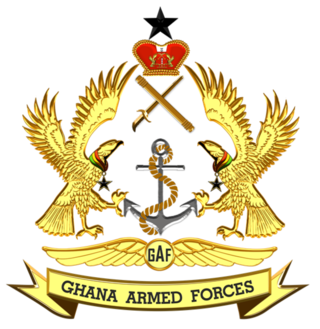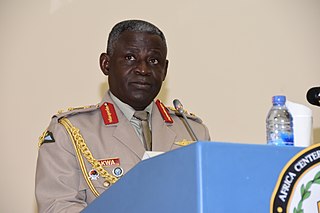
The Ghana Armed Forces (GAF) is the state military organisation of Ghana, consisting of the Army (GA), Navy (GN), and Ghana Air Force.

The Ghana Air Force (GHF) is the aerial warfare organizational military branch of the Ghanaian Armed Forces (GAF). The GHF, along with the Ghanaian army (GA) and Ghanaian navy (GN), make up the Ghanaian Armed Forces (GAF), which are controlled by the Ghanaian Ministry of Defence (MoD).

Joseph Arthur Ankrah was a Ghanaian army general who was head of state of Ghana from 1966 to 1969 as Chairman of the National Liberation Council. He was Ghana's first military head of state. Ankrah also served as Chairperson of the Organisation of African Unity from 24 February 1966 to 5 November 1966. Previously, Ankrah was appointed the first commander of the Ghana Army in 1961.

The University of Ghana is a public university located in Accra, Ghana. It is the oldest public university in Ghana.
The Ga-Dangbe, Ga-Dangme, Ga-Adangme or Ga-Adangbe are an ethnic group in Ghana, Togo and Benin. The Ga or Gan and Dangbe or Dangme people are grouped as part of the Ga–Dangme ethnolinguistic group. The Ga-Dangmes are one ethnic group that lives primarily in the Greater Accra region of Ghana.

Joseph Kwame Kyeretwie Boakye Danquah was a Ghanaian politician, scholar, anglophile, lawyer and statesman. He was a politician in pre and post-colonial Ghana, which was formerly the Gold Coast.
Articles related to Ghana include:

The Ghana Army is the principal land warfare force of Ghana. In 1959, two years after the Gold Coast became independent from the British Empire, the Gold Coast Regiment was withdrawn from the Royal West African Frontier Force and formed the basis for the new Ghanaian army. Together with the Ghana Air Force and Ghana Navy, the Ghana Army makes up the Ghana Armed Forces, which is controlled by the Ghanaian Ministry of Defence and Central Defence Headquarters, both of which are located in the Greater Accra Region.

Air Commodore John Nicholas Haworth Whitworth, was a Royal Air Force pilot in the 1930s and a commander during and after the Second World War. He was educated at Oundle School in Northamptonshire.

The Chief of the Defence Staff (CDS) is the professional head of the Ghana Armed Forces. He is thus responsible for the administration and the operational control and command of the Ghana military. The CDS is a member of the Armed Forces Council. This council advice the President of Ghana on matters of policy relating to defence and also regulates the administration of the Armed Forces. It also advises the President on the promotion of all officers above the rank of Lieutenant-Colonel or its equivalent.

The Ghana Navy (GN) is the naval warfare organizational military branch of the Ghanaian Armed Forces (GAF). The Ghanaian Navy, along with the Ghanaian Army (GA) and Ghanaian Air Force (GHF), make up the Ghanaian Armed Forces (GAF) which are controlled by the Ghanaian Ministry of Defence (MoD).

Rear Admiral David Animle Hansen was a Ghanaian naval officer who served as Chairman of the Greater Accra Regional Administrative Committee from 1966 to 1967 in the National Liberation Council regime and as Commander of the Ghana Navy from 1962 to 1967. He was the first Ghanaian to be appointed head of the Ghana Navy. Hansen was also the founding director of the National Vocational Training Institute, and held this office from 1970 to 1980.

Beattie Casely-Hayford was a Ghanaian engineer. He was the first director of the Ghana Arts Council, a co-founder of the Ghana National Dance Ensemble, and a director of the Ghana Broadcasting Corporation (GBC).
Lieutenant General Winston Mensa-Wood was a former Ghanaian military officer and served as the twenty-third Chief of Defence Staff of the Ghana Armed Forces from June 1990 to March 1992. He took over from Lieutenant General Arnold Quainoo but died in office. He was replaced by Air Marshal Achilles Harry Kwami Dumashie. Prior to that, he was Chief of Army Staff from 1987 to 1990.

Lieutenant General Obed Boamah Akwa is a retired Ghanaian military officer who served as the Chief of the Defence Staff of the Ghana Armed Forces from February 2017 to February 2021. Prior to his appointment, he was the Chief of Army Staff of the Ghana Armed Forces.

Louis Casely-Hayford was a Ghanaian chartered engineer who served as the third CEO of the Volta River Authority (VRA) from 1980 to 1991. He was CEO of the VRA when the master-plan for extension of electricity to the northern parts of Ghana was conceived. He led the creation of the VRA Training School, which trained engineers, technicians and other disciplines needed to support the power sector of Ghana. Casely-Hayford also played monumental roles as CEO in the development of Kpong Power Project.
Brigadier Joseph Edward Michel (1917-1961) was a Ghanaian soldier. He was one of the early commissioned officers in the Ghana Army.
Michel Camp is the base of the First Battalion of Infantry of the Ghana Army. It is located at Tema in the Greater Accra Region of Ghana. The First Battalion together with the Second and Fifth Battalions of Infantry make up the Southern Command of the Ghana Army.











